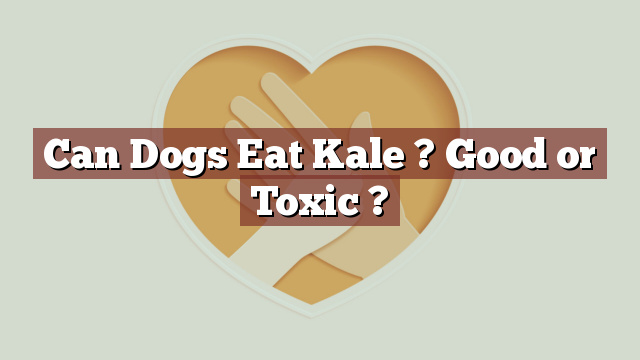Can Dogs Eat Kale? Good or Toxic?
Knowing what foods are safe for our pets is crucial for their overall health and well-being. In this article, we will explore whether dogs can safely consume kale, a popular leafy green vegetable. We will examine its nutritional value, discuss its safety for dogs, and address any potential risks or benefits associated with kale consumption. Furthermore, we will provide guidance on what to do if your dog happens to eat kale. So, let’s dive in and uncover the truth about dogs and kale.
Nutritional Value of Kale: A Detailed Analysis
Kale is a nutrient-dense vegetable that offers several health benefits for humans. It is rich in vitamins A, C, and K, as well as minerals like calcium and potassium. Additionally, kale contains antioxidants and fiber, making it a valuable component of a balanced human diet.
Can Dogs Eat Kale? Unveiling the Truth about Safety
Can dogs eat kale? Yes, dogs can eat kale in moderation. While kale is generally safe for dogs to consume, it is important to note that it should be offered as an occasional treat rather than a staple part of their diet.
Some scientific evidence suggests that kale can be beneficial for dogs. Its high vitamin content can support their immune system and contribute to healthy skin and coat. However, it is crucial to avoid adding any seasonings, oils, or dressings to the kale, as these can be harmful to dogs.
Potential Risks or Benefits of Kale Consumption for Dogs
While kale can provide certain health benefits to dogs, there are also potential risks associated with its consumption. Kale belongs to the cruciferous vegetable family, which contains compounds known as glucosinolates. In large quantities, these compounds can interfere with the proper functioning of a dog’s thyroid gland. Therefore, it is important to feed kale to dogs in moderation to avoid any potential thyroid issues.
Additionally, the fibrous nature of kale may pose a digestive challenge for some dogs. Consumption of large amounts of kale can lead to gastrointestinal discomfort, including bloating and gas. It is advisable to introduce kale gradually into your dog’s diet and monitor their response to ensure they can tolerate it well.
My Dog Ate Kale! What Should I Do?
If your dog happens to consume kale, there is generally no need to panic. However, it is crucial to monitor your dog for any adverse reactions. If your dog exhibits symptoms such as vomiting, diarrhea, or unusual behavior, it is recommended to consult your veterinarian for further guidance.
To Kale or Not to Kale: Our Final Verdict on Dogs and Kale
In conclusion, dogs can safely eat kale in moderation. As with any new food, it is essential to introduce kale slowly and monitor your dog’s reaction. While kale offers some nutritional benefits, it is important to be cautious due to its potential risks associated with the thyroid gland and digestion. Remember, consulting your veterinarian is always the best course of action when it comes to determining what foods are safe for your furry friend.
By being mindful of your dog’s diet and ensuring a balanced and appropriate intake of nutrients, you can help promote their overall health and happiness.
Thank you for investing your time in exploring [page_title] on Can-Eat.org. Our goal is to provide readers like you with thorough and reliable information about various dietary topics. Each article, including [page_title], stems from diligent research and a passion for understanding the nuances of our food choices. We believe that knowledge is a vital step towards making informed and healthy decisions. However, while "[page_title]" sheds light on its specific topic, it's crucial to remember that everyone's body reacts differently to foods and dietary changes. What might be beneficial for one person could have different effects on another. Before you consider integrating suggestions or insights from "[page_title]" into your diet, it's always wise to consult with a nutritionist or healthcare professional. Their specialized knowledge ensures that you're making choices best suited to your individual health needs. As you navigate [page_title], be mindful of potential allergies, intolerances, or unique dietary requirements you may have. No singular article can capture the vast diversity of human health, and individualized guidance is invaluable. The content provided in [page_title] serves as a general guide. It is not, by any means, a substitute for personalized medical or nutritional advice. Your health should always be the top priority, and professional guidance is the best path forward. In your journey towards a balanced and nutritious lifestyle, we hope that [page_title] serves as a helpful stepping stone. Remember, informed decisions lead to healthier outcomes. Thank you for trusting Can-Eat.org. Continue exploring, learning, and prioritizing your health. Cheers to a well-informed and healthier future!

